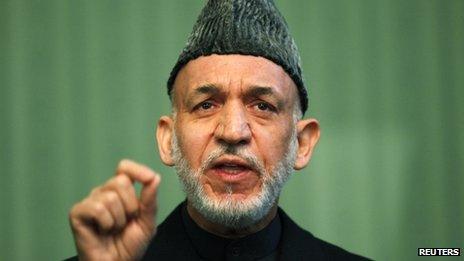Afghanistan-US deal 'hinges on Taliban peace talks'
- Published

President Karzai said that peace in his country lay in US hands
Afghan President Hamid Karzai has reiterated his refusal to sign a key US security pact until a peace process is under way with the Taliban.
"Afghanistan will absolutely not accept or sign anything under pressure," he said at a news conference on Saturday.
Most Nato-led foreign combat forces are due to leave this year, as combat operations are declared to be over.
Without a deal, the US will not be able to keep troops in Afghanistan after the end of 2014.
The pact, known officially as the Bilateral Security Agreement, was agreed in principle last year, but Mr Karzai has consistently refused to sign it.
The agreement would see up to 15,000 international troops remain behind to train and mentor Afghan forces.
Some special forces would stay to conduct "counter-terror operations".
In December, a top Afghan general warned that his nation may be dangerously exposed without the deal, in the face of continuing Taliban violence.
'Under pressure'
On Saturday, President Karzai said that peace in his country lay in the hands of the US and Pakistan, demanding that they bring the Taliban to the negotiating table.
"If the US is not willing to accept our conditions, they can leave anytime and we will continue our lives," he told reporters in the Afghan capital, Kabul.
"Our main condition is the practical start of a peace process, [which] would mean that no foreigners can benefit from the continuation of war."
Mr Karzai added that if he were to sign the deal, he would become responsible if Afghans were killed by US bombs.
He called on the US to be a friend not a rival, but then compared them directly with colonial Britain in the 19th Century - imposing deals on Afghanistan that ultimately led to war, the BBC's David Loyn, in Kabul, reports.
The US government is increasingly considering the zero option and recall all troops from Afghanistan after this year, our correspondent says.
Last month, the head of Afghanistan's ground forces, Lt Gen Murad Ali Murad, told the BBC the army would struggle without US support.
"Without the foreign forces we will have challenges and problems when it comes to the equipping and training of the Afghan national army," he said.
"We don't share the view that Afghanistan will slip back into civil war but we need more support and resources so we can deal with the threat posed by the insurgents especially during elections."
After months of negotiation, the pact was endorsed at a national gathering (Loya Jirga) of Afghan elders in Kabul in November.
Mr Karzai, who has served two terms as Afghanistan's first and only president since the Taliban were ousted from power in 2001, is obliged by law to stand down after elections in April.
The Nato-led international peacekeeping force (Isaf) handed security for the whole country over to Afghan forces last year, but some 57,000 soldiers remain, of whom some 38,000 are Americans, according to the latest Isaf figures., external.